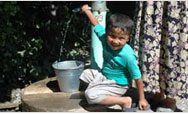 |
|
 |
 |
 |
USAID Information:
External Links:
|
|
 |
 |
|
 |
 |
|
A Generation of Montenegro’s Future Political Leaders Graduates from Year-Long Training
Understanding how a political party functions remains essential to ensuring effective internal organization and responsive representation of citizens' interests. True political leadership also resists common appeals to using race, religion, culture, ideology, or other differences as campaign messages or party platforms.
As part of the Democratic Leadership School (DLS) organized by the Podgoricabased Nansen Dialogue Center, the National Democratic Institute (NDI), with funding from USAID, took the lead on an effort that sought to build such political skills in Montenegro's future leaders. The program focused on participants from northern municipalities that do not enjoy the same access to training opportunities as their colleagues from the capital.
Through a series of seminars, nearly 30 young leaders have learned new ideas and tools in a wide variety of important fields, including teambuilding, leadership, policy development, strategic planning, advocacy, message creation and delivery, and interparty organization and communication. NDI has also worked with participants on party-specific projects that address their particular party-building needs. The yearlong program has witnessed a number of significant results. In March 2005, eight DLS students stood as candidates in extraordinary elections for municipal councilor in the town of Niksic. As active participants in the campaign, all used their newly acquired skills to develop and deliver party messages and literature. Over the past year, several other participants assumed new roles within their parties, including secretary of the party branch and vice president of youth at the Republic level. Twelve participants were trained as trainers within their party and have successfully conducted trainings throughout the country. And more than 1,000 questionnaires - internal and external - have been distributed in various municipalities in an effort to recruit members, strengthen party infrastructure, and listen to the voters.
The relationships that have been built across polarized party lines - in a time of high political tension in Montenegro – represent perhaps the most significant achievement.
One participant noted, "We learned to respect the positions of our colleagues from different political parties and to communicate with them in a civilized way even if we did not agree with them - which is very important in our political milieu."
Another singled out teamwork as one of the most important lessons learned, "Despite all our differences, mostly political, we were able to find a common language and, in the most difficult times, solve problems, take positions, and act like a real team."
The accomplishments of these students were recognized at a graduation ceremony held in the coastal town of Milocer in February 2005. USAID Mission Director Keith Simmons awarded diplomas to participants from the northern branches of all parliamentary political parties in Montenegro - the first generation of graduates of the one-year training program. In addition to USAID funding and NDI assistance, the Nansen Dialogue Center organized the program with support from the Organization for Security and Cooperation in Europe (OSCE), the Open Society Institute (OSI), and the World Bank. Given the success of last year's school, the Nansen Dialogue Center has asked USAID/NDI, OSCE, and OSI to join them again in organizing the school for a second generation, scheduled to commence in April 2005.
Back to Top ^ |


